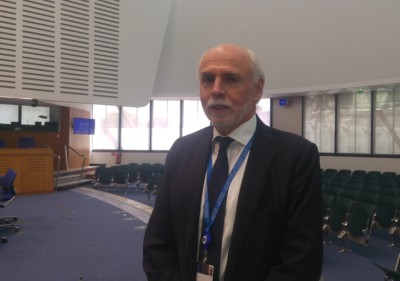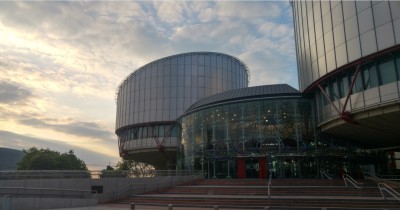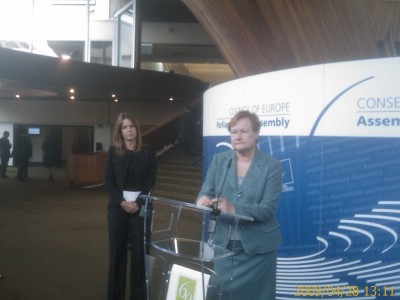 newsitems
newsitems  ECHR Chief Registrar Liddell to EF on Discretionary Power's Decision-Making Process' control
ECHR Chief Registrar Liddell to EF on Discretionary Power's Decision-Making Process' control
ECHR Chief Registrar Liddell to EF on Discretionary Power's Decision-Making Process' control

*Strasbourg/CoE/Angelo Marcopolo/(Partly UPDATED)/- Replying to an "Eurofora" Question on the Judicial Control of Public Administration's Discretionary Powers, and, particularly, if and when, according to ECHR's case-law, this should include, or not, a part of Supervision on the way that they take into account concerned Citizens' relevant arguments, in order to adequately Reply to them, (in a kind of Procedure of Dialogue between Citizens and State, or "Controle du Processus Decisionel" in French), ECHR's Chief Registrar, Roderick Liddell, who has a very Extensive Experience of the PanEuropean Court's work since several Decades, after Studying Law at Oxford University and working as Legal Expert, Assistant to ECHR's President, Chief of Press/Communication, Head of Strasbourg Court's General Services, and Elected on December 2015 as Registrar responsible for about 600 Legal and Administrative Staff at the ECHR, appeared Both Positive and Pedagogically crystal-clear, on the Substance of that matter :
+ And, Surprizingly, a Long Series of ECHR's Judgements Published just Yesterday in Strasbourg, seems to consistently Support, with Concrete Evidence, at least the Main Thrust of Roderick Liddell's Replies to "Eurofora"s Questions, concerning Human Rights and the Judicial Supervision of Public Authorities' Discretionary Powers, as we shall see Infra...

- "I think, that There has Always been this Procedure Element", he surprisingly told us, from the outset, adopting a quite original approach.
- indeed, "for me, Procedure has a Role to Play in almost Every Article of the (PanEuropean Human Rights') Convention !", he stressed. "It has Always been a Procedure Element. There has always been an important Procedure Dimension".
- "Because, part of the Aim of the Convention is to Create a Situation where Applicants can obtain Redress in their Domestic System".
- "So that involves having the necessary Procedures and Structures in place, to be Able to pursue the Verification of Conventions' complaints at National level".
- "Part of it is to have procedures in place which are Able to Ensure that, when the Convention is examined at National Level, then, the National Authorities go through the Necessary Process of Taking into Account the Competing Interests, in the Light of the Strasbourg's Case-Law".
- "It's a Question of Procedures Affecting the Settlement", he Positively replied to "Eurofora"s secondary Question if this really includes also the Exchange of Arguments (in a kind of Dialogue, or "Procedure Contradictoire" in French) with the concerned Citizens.
- "If you see f.ex. at Article 8 (protecting Private/Family Life), ECHR's case law Requires that when it looks if National Authorities have Examined the Issue of Proportionality, then, the Question of the Existence of that Procedure, and the Course of that Procedure are in there...", he pointed out in conclusion,
(Stressing particularly that Last Point on the "COURSE" of that "Examination Procedure", which seems, indeed, Similar to what we call in French : - "Contrôle du Processus Decisionel", or, alias : "Checking the Decision-Making Process", even in cases of Discrerionary Power detained by Public Authorities).
Liddell spoke to "Eurofora" on the Sidelines of the Official Ceremony, Headed by CoE's Secretary General, Thornbjorn Jagland, for the Award of Prizes won by the Best Teams competing at the Final Round of the European Law Students' Association (ELSA) Annual Moot Court contest, in ECHR's Headquarters, at the 10th Anniversary of its regular Cooperation with the CoE, Hailed this year by the Chairman-in-office of the PanEuropean Organisation's Highest Political Body : that of its Committee of Ministers, Danish Ambassador/Permanent Representative to the CoE, Arnold de Fine Skibsted, after a Strong Competition between a Hundred of Registered Universities from all around Europe, among which, 19 were invited to Strasbourg for the Final Round, won by Spanish IE University (Madrid), facing London's Kings College (which got the 1st Individual Plaidoyerie prize, instead, See : http://www.eurofora.net/newsflashes
Both this CoE-ELSA English Speaking Moot Court Competition, and the Equivalent, French-Speaking Contest at ECHR organized by the International Institute for Human Rights "René Cassin", (very Popular in Strasbourg : See "Eurofora"s NewsReport from its Recent, 2018 Awards, at: http://www.eurofora.net/newsflashes/news/whistleblowersatrenecassinechrcontest.html), are notoriously Focusing mainly on Developing the Capacity of those Representing a respondent State, and/or one or more Applicant Citizens, to Exchange Facts and/or Arguments, in relation with ECHR's case-law Principles.
--------------
+ By a timely Coincidence, this week, ECHR has just Published a Series of various New Judgements, concerning Different States and Different aspects of key Human Rights, (f.ex., unreasonable Delays in Length of Proceedings, InHuman/Degrading Treatments, etc), which all Focus mainly on a Similar Key-Point:
- Always in these Cases, ECHR consistently reiterates, indeed, that: EuroJudges have "Examined all the Material Submitted" to the Court by the Parties, (i.e. the applicant CITIZENS and the respondent STATE), but have "Not found any FACT or ARGUMENT Capable of PERSUADING" them, "to Reach" this or that "Conclusion" on this or that Concrete Human Rights' Legal Issue, "Regard(ing)" ECHR's "Case Law on the subject" concerned there.
=> I.e., ECHR obviously evokes a kind of DIALOGUE, Between Citizen and State, using Facts and Arguments, capable of Persuading, in order to Reach this or that Conclusion, on Human Rights, regarding ECHR's Case-Law principles :
>>> That seems to be Exactly what "Eurofora"s co-Founder has Found, Described, Analysed and Defined (initially Named, at the Original in French : "Contrôle de Légalité du Processus Decisionel d'un Pouvoir Discretionaire"), both in Legal Scientific Research (already made, Basically, since a Long Time Ago at certain University Papers, to which were Added, Meanwhile, also active paticipations to certain Scientific Conferences), as well as in Recent Legal Research and/or Journalistic, Original Press Reports, at least Partly Related, Moreover, to "Eurofora"s main Project about Innovative Social Uses of New Digital/Communication Technologies 1997-2018, in Parallel) !
+ In Certain among this Long Series of Cases, whose Judgements were published this Week, ECHR even goes as far as to clearly Explain, one by one, at least the Main Points on which Citizens and States should Focus in their Dialogue whenever an important Decision affecting Human Rights is to be taken :
In Concrete terms, it naturally Depends on the Particular Right concerned in one or another Case : F.ex., concerning the "Length of Proceedings" of Public Authorities, ECHR explains anew that "the Reasonableness", or not, of such Delays, "must be Assessed, in the light of the Circumstances of the case and with reference to the following Criteria: the Complexity of the case, the Conduct of the applicants and the relevant authorities, and what was at Stake for the applicants in the dispute".
It's on these Key-Points, that a kind of Dialogue between Citizens and States, whenever relevant Decisions affecting those Human Rights are taken, should Focus, according to the ECHR.
=> In Conclusion, all these Converging, older and recent Facts, clearly appear to Justify ECHR Registrar, Roderick Liddell's above-mentioned, interesting Statements, made (as a matter of General Principle, and on the basis of his particularly Extensive Experience) in Reply to relevant "Eurofora"'s Questions, (Comp. Supra), concerning a Core Legal (and Socio-Political) Issue of Nowadays European Society and well beyond.
-------------
+ For anOther, and also very Interesting, Approach of this Same Issue, from a Different Angle/Point of view, (but, in fact, clearly Complementary), See Also the Extensive Reply that ECHR's President himself, Guido Raimondi, kindly gave to a relevant "Eurofora"s Question during his Annual Press Conference, already as early as since January 2018, at : http://www.eurofora.net/newsflashes/news/echrpresidentondiscretiionarypowercontrol.html).
Obviously, President Raimondi's above-mentioned Reply to "Eurofora"s Question during ECHR's Press Conference, also Points at Both Recent and Forthcoming Judgements adding more or less New Developments, which may unfold also in the foreseeable Future, in a kind of On-Going Evolutionary Trend (as he Observed himself), already set in Motion...
----------------------------
Main Menu
Haupt Press Deontology/Ethics 2009 Innovation Year EU endorses EuroFora's idea Multi-Lingual FORUM Subscribers/Donors Häufig gestellte Fragen Die Elxis Lizenz Erweiterte Suche EuroFora supports Seabird newsitems In Brief European Headquarters' MAPs CoE Journalists Protection PlatformBRIEF NEWS
- 00:00 - 02.06.2021
- 00:00 - 18.10.2020
- 00:00 - 19.06.2020
- 00:00 - 18.05.2020
- 00:00 - 20.04.2020
- 00:00 - 02.02.2020
- 00:00 - 09.12.2019
- 00:00 - 27.11.2019
- 00:00 - 16.11.2019
Popular
- Yes, we could have prevented Ferguson riots says World Democracy Forum's Young American NGO to ERFRA
- Spanish People Elect CenterRIGHT Majority with 1st Party and Total of 178 MPs (6 More than the Left)
- Pflimlin's vision
- The European Athletic "Dream Team", after Barcelona 2010 Sport Championship Results
- Source Conseil d'Europe à ERFRA: Debatre Liberté d'Opposants à Loi livrant Mariage+Enfants à Homos ?
- Head of BioEthics InterGroup, MEP Peter Liese : "Embryonic stem cell research reaching its END" !?
- Spain: Jailed Turkish Terror suspect with Explosive,Drones,Chechen accomplices stirs Merah+ Burgas ?
- UN Head Ban Ki Moon at CoE World Democracy Forum : - "Listen to the People !"
Latest News
- EUOmbudsmen Conference 2022: Digital Gaps affect People's Trust threaten EF Project on EU Future ?
- French Election : Black Out on Virus, but Obligation for Fake 'Vaccines" Challenged
- Both French Presidential Candidates point at "Humanism" in crucial times...
- France : Zemmour = Outsider may become Game Changer in Presidential + Parliamentary Elections 2022
- PACE President Cox skips Turkey Worst (Occupation) case compared to Russia (DeMilitarisation) query
Statistics
Besucher: 56818268Archive
Login Form
Other Menu

People in Europe and the World expect from CoE to make a succes of its "Monitoring" for Human Rights and Democracy, despite difficulties, said Finland's President Tarja Halonen to "EuroFora" at a crucial moment for the mecanism built 15 years ago by the paneuropean organization which celebrates its 60th Anniversary in 2009.
Halonen, known as "Mother" of CoE's "Monitoring" mecanism, a long-time MEP and former Foreign Minister before becoming Finland's President, holds a long experience in the mattter, after also serving twice as CoE and EU Chairwoman in the past. That's why she is well placed to judge how CoE's "monitoring" should deal today with some crucial issues of importance both to CoE and to the EU.
The move came just a Month before a crucial, last visit to Turkey, scheduled for June, by the President of CoE''s "Monitoring" Committee, Ukranian MEP Serge Holovaty, to finalize his Report on Ankara, the CoE Member State with the longest Monitoring procedure. From its results depends its overall credibility.
This is a Test-case, because, in fact, it's in order to avoid Sanctions threatened against Turkey by a CoE's Assembly's April 1995 Resolution for grave Human Rights violations, Democracy gaps, the continuing Military Occupation in Cyprus, the unresolved Kurdish problem, Aegean differend with Greece, etc., that MEPs decided to create, for the 1st time on April 1996, a "Monitoring" proces, allegedly destinated to check, without excluding Countries who did not fulfill all CoE's standards.
In the Past, the obliged withdrawal of Greece's Military regime and of its "Civil" cover-up out of the CoE had helped bring back Democracy in 1974. But, on the contrary, since April 1996, the idea was to "monitor" Human Rights' respect while keeping most concerned Countries inside the CoE. After Turkey's oldest example, this was extended also to several former "Eastern" European Countries, even if CoE's Assembly has imposed to some of them (fex. Ukraine, Russia, etc., after Belarus, Serbia, etc) various "Sanctions", that Ankara always avoided. Curiously more succesful even than .. USA itself, (a CoE "Observer" since 1995), which has been at least threatened with sanctions some years ago..
EU-effects of CoE's Monitoring process became obvious between 2001-2008, since the "closure" of this procedure, when CoE felt that a Country had met most of its Human Rights, Democracy and Rule of Law obligations, (i.e. the "Copenhagen Criteria" for the EU), helped trigger Negotiations with the EU for "Accession" or other closer relations : This occured already before the 2004 and 2007 EU Enlargements to former "Eastern" European Countries, as well as for the commencement of "accession" negotiations with Croatia, and of "open-ended" negotiations with Turkey in 2005.
But a stricking new development are Holovaty's recent findings that on core Human Rights issues as Torture and Freedom of Expression, Turkey, even "5 Years after" CoE closed its "Monitoring", back in 2004, inciting EU to start accession Negotiations in 2005, still presents grave problems.
His findings are of crucial importance after a 2008 CoE Resolution called, "if need be", to "seriously consider the possibility of Re-Opening the Monitoring procedure for Turkey" : A move which might affect Ankara's controversial EU bid, since EU Accession Negotiations are based on the Hypothesis that the Candidate fullfils the "Copenhagen Criteria" (See above)..
-------------------------
Holovaty expressed his will to check "Matters still Outstanding" and those that he "didn't have an opportunity to discuss" at an earlier visit this year, "in order to discuss the more complex issues in greater depth", at his forthcoming New Visit to Ankara, before the December 2009 EU Summit. This is all based on the 2004 CoE Resolution which stresses that, CoE "will continue.. post-monitoring Dialogue with the Turkish authorities,...in addition to a 12-points list,..and on any Other Matter that might arise in connection with Turkey’s Obligations as a CoE member state".
CoE's Resolution also asks from Turkey "to secure the proper Implementation of Judgements, particularly in the Cyprus v. Turkey InterState case", of 2001, which concerns also the plight of many Hundreds of MISSING People. It adds Turkey's obligations to "execute" ECHR's Judgements in the Loizidou case,..and in particular adopt General Measures to avoid repetition or continuation of Violations found by the Court" to the detriment of Refugees.
Nevertheless, Holovaty said to "EuroFora" that "MISSING" persons,"might be included" and cannot be excluded, but he has yet to examine the situation "to find out which issues will be raised" to the Turkish Government.
Therefore, "EuroFora" asked Halonen, as the Historic "Mother" of CoE's Monitoring mecanism, if she thought that, "whenever there are grave Human Rights Violations, as fex. "MISSING" persons, attested even by ECHR's judgements, they should be always checked by a Monitoring process. Or could they be forgotten ?"
- "We (CoE) must be, at the same time, Fair, Realistic, but not in the mind that "now we have Forgotten", etc., replied to "EuroFora"'s question Halonen, speaking as a matter of general principle.
- "When we think of those People that are suffering from the lack of Democracy, of Human Rights, and of the Rule of Law", "we should find a base on how to deal with the (Monitoring) system more rapidly"', she stressed.
- "Sometimes it's very difficult to combine Transparency and Effectivenes together, particularly in this specific case", she went on to say. But, "I have not found a (CoE Member) Country who could be insensitive in this sens", Halonen answered concerning grave Human Rights violations attested by the ECHR.
- "I have no ready-made answer. I have the expectations that you, in the CoE, will, step by step, find the different types of the monitoring systems."
Also "because this is a part of the UN's Post-Conflict system, (fex. when it comes to Cyprus' MISSING persons), and it's a more Global system". So that, "If we make a succes in Europe, the others will follow", throughout the World. "But they expect that we (Europe) are this opportunity, this Opportunity to make a Succes", Halonen concluded.
In addition, she advised to extend CoE's Monitoring to all its 47 Member States, "because, as long as we hear that, all these monitoring systems are "OK for the neighbor, but not for me", "it's very difficult" to understand. Something which could make easier to Compare...
Finnish MEP Jaako Laakso, former CoE Rapporteur on the Occupied Territories of Cyprus and one of the 5 Signatories of the Historic CoE's call to create the "MONITORING" mecanism since 1996, was more specific : - "We (CoE Assembly) have to find a way for the issue of Cyprus' MISSING People to be better followed", he stressed, anouncing his intention to "speak to Mr. Holovaty" about that. "There might be also other ways", added Laakso.
- The 2008 "Year had been a very Bad one for Turkey with regard to Human Rights in general, and Freedom of Expression in particular", denounced, meanwhile, Holovaty's preliminary Post-Monitoringh Draft Report by Holovaty, published by the CoE on April 2009.
"Amnesty International believes that freedom of expression is not guaranteed given the various articles of the Criminal Code that restrict it. .. "For example, 1,300 Websites are said to have been closed down by the (Turkish) authorities in 2008" ! While "the new Turkish Criminal Code was used to bring a total of 1,072 proceedings between June 2005 and April 2008, and led to the conviction of 192 people", for expressing views. "Representatives of the Özgür Gündem newspaper, which specialises in Kurdish affairs, ..complained about Numerous Attacks on their Freedom of Expression ...as was everyone who advocated a settlement to the question by means other than the intervention of the army" "According to their figures, 19 Newspapers had been suspended 43 times between 4 August 2006 and 4 November 2008" !...
Moreover, on 2008, CoE's "Ministers adopted its 4rth Resolution on the execution of the judgments of the ECHR, ...and outstanding issues regarding 175 Judgements and decisions relating to Turkey delivered between 1996 and 2008... concerning Deaths resulting from the excessive use of force by members of the Security forces, the failure to protect the right to life, the DIisappearance and/or death of individuals, Ill-Treatment and the Destruction of property". CoE's " Ministers urged the Turkish authorities ...to ensure that members of Security forces of all ranks can be prosecuted without administrative
authorisation" for "serious crimes". Holovaty reminded.
"Nonetheless", Holovaty heard anew of "Several cases of Violence committed last year (2008) by the (Turkish) security forces". Amnesty International speaks of Many Cases of ill-treatment and Torture in the prisons and by the police". "Including, fex."'the death of Engin Ceber, a young man of 29 who died on October 2008 as a result of the TORTURE allegedly inflicted on him by police officers, prison staff and members of the gendarmerie. He was part of a group of people arrested on September 2008 during a demonstration and Press Conference in Istanbul'. Proceedings against suspects are "on-going" in this case.
- " I therefore noted an Obvious Contradiction between the Government’s stated “zero tolerance” policy.... of Torture and other forms of ill-treatment, and the different testimonies given", denounced CoE's Rapporteur. Turkish "authorities must make considerable efforts to guarantee that proper investigations are carried out into allegations of abuses by members of the security forces and that perpetrators are effectively punished" "In this respect, I have requested detailed Statistics on the number of Investigations, acquittals and convictions in cases involving allegations of abuse in order to show the positive impact of the measures taken to date", Holovaty said, repeating a permanently unsatisfied CoE's demand to Turkey since a Decade...
- "The Political Crisis that shook the country in the spring of 2008 highlighted the Weaknesses of the (Turkish) Constitution", which comes from the Military regime of 1982, "and the Urgent Need of Reforms", stressed from the outset CoE's Rapporteur in 2009. In particular, "the ...Democratic functioning of state institutions, including the independence of the judicial system, are crucial", he observes.
But, "the Electoral system and the ways in which it is circumvented do not appear to give those elected complete Legitimacy, and tend to pervert the course of direct universal suffrage", denounces Holovaty, observing that, even 5 Years later, Turkey did not yet change the 10% nationwide Threshold for a party to take any seat, which is "far higher" than the "3%" maximum in Europe and already condemned as contrary to European Standards by the CoE.
+ Moreover, EU Parliament's 2009 Report on Turkey, drafted by Dutch MEP Ria Oomen-Ruijten and adopted in Strasbourg on March, expresses "Concern over the Failure of the (Turkish) Judiciary to prosecute cases of Torture and Ill-treatment, the Number of which is Growing". EU also "is concerned about continuing Hostility and Violence against Minorities" in Turkey. It also "calls on the Turkish Government to launch, as a matter of Priority, a Political Initiatve favouring a lasting Settlement of the Kurdish issue, (while "condemning violence.. and terrorist groups"). EU "regrets that No progress has been made on establishing full, systematic Civilian suprevisory functions over the (Turkish) Military".
The final results of Holovaty's 2nd and last visit to Turkley will be known later this year, and, at any case, before EU's December 2009 Summit.
Polls
SMF Recent Topics SA
- Record Hospitalisati... (0) durch Breadman
- How Many Infected by... (1) durch Thunderbird
- Real Cause for Europ... (0) durch Breadman
- Interesting Australi... (0) durch Aurora
- Plus de mRNA Faux-&q... (0) durch Aurora
- EU: Lukashenko as E... (0) durch WKalina
- Why NATO in Ukraine,... (0) durch Geopol
- Afghanistan's key : ... (0) durch Thunderbird
- Anti-Pass Demonstrat... (0) durch Aurora
- Veran - Fioraso : Mê... (1) durch JohnsonE


















